Module 2 Public holidays Unit 1 重点知识归纳和语法讲解及练习(含答案)
文档属性
| 名称 | Module 2 Public holidays Unit 1 重点知识归纳和语法讲解及练习(含答案) |
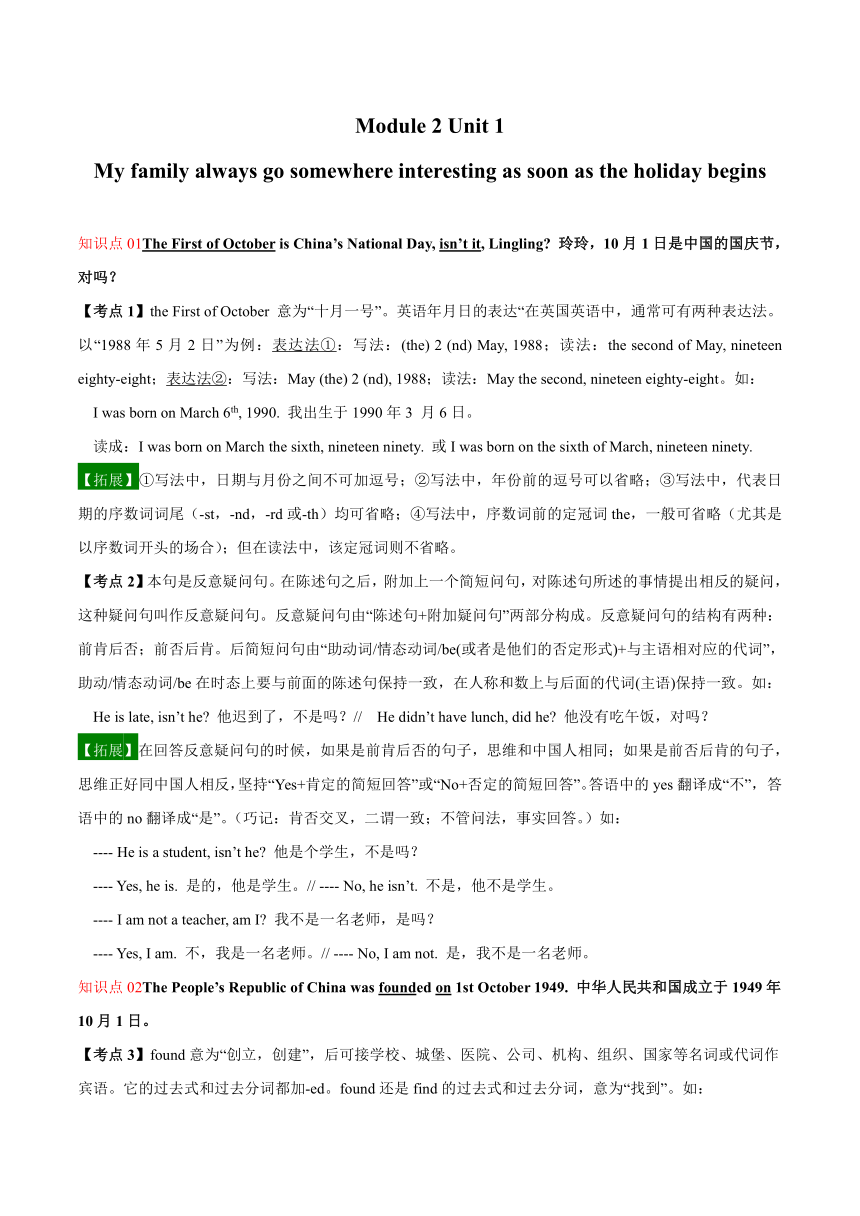
|
|
| 格式 | zip | ||
| 文件大小 | 105.0KB | ||
| 资源类型 | 教案 | ||
| 版本资源 | 外研版 | ||
| 科目 | 英语 | ||
| 更新时间 | 2023-01-16 00:00:00 | ||
图片预览

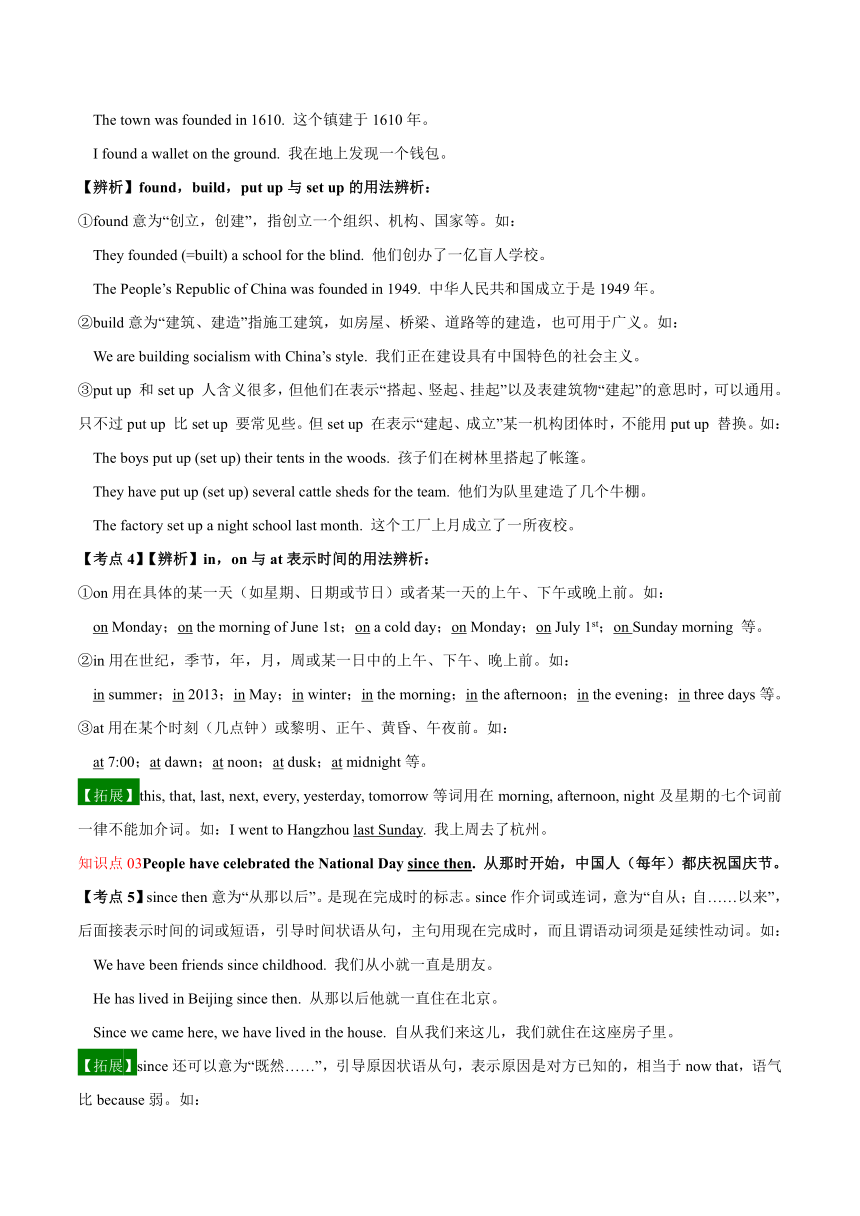
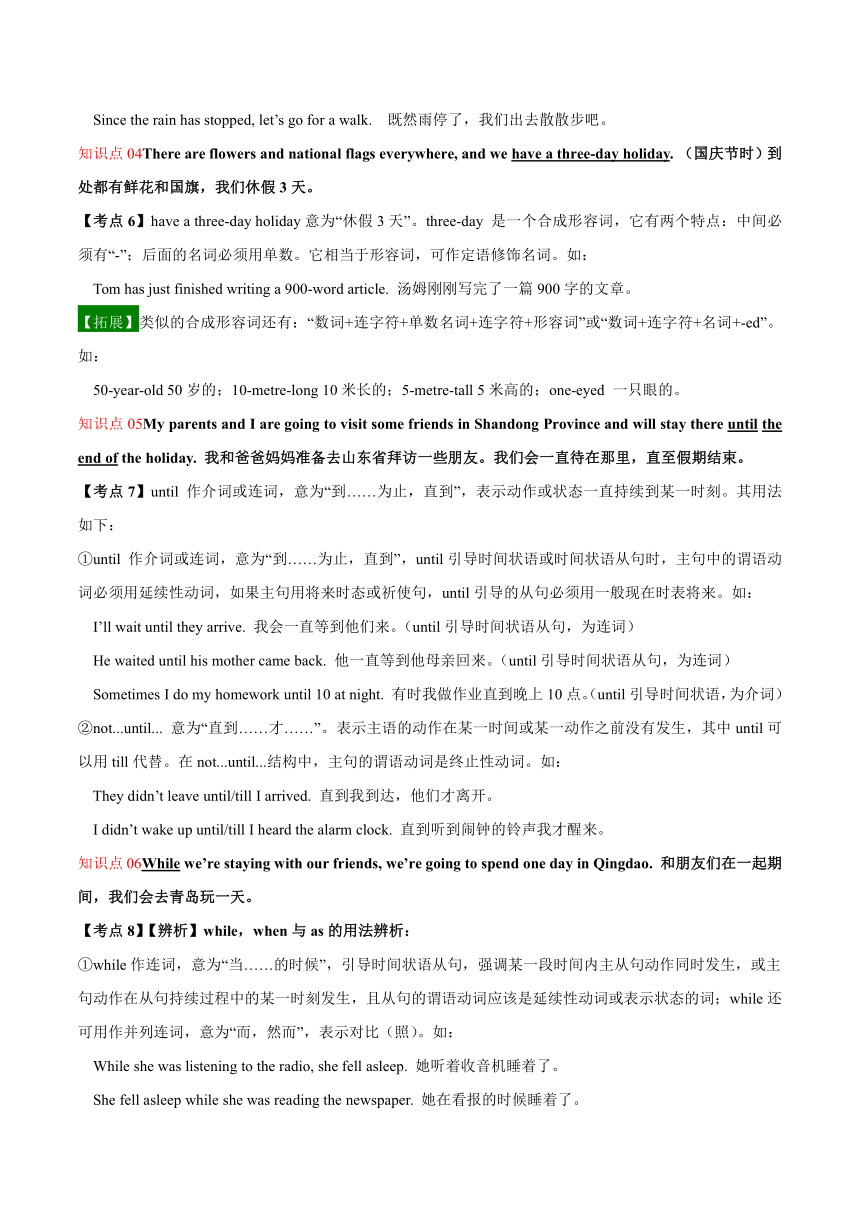
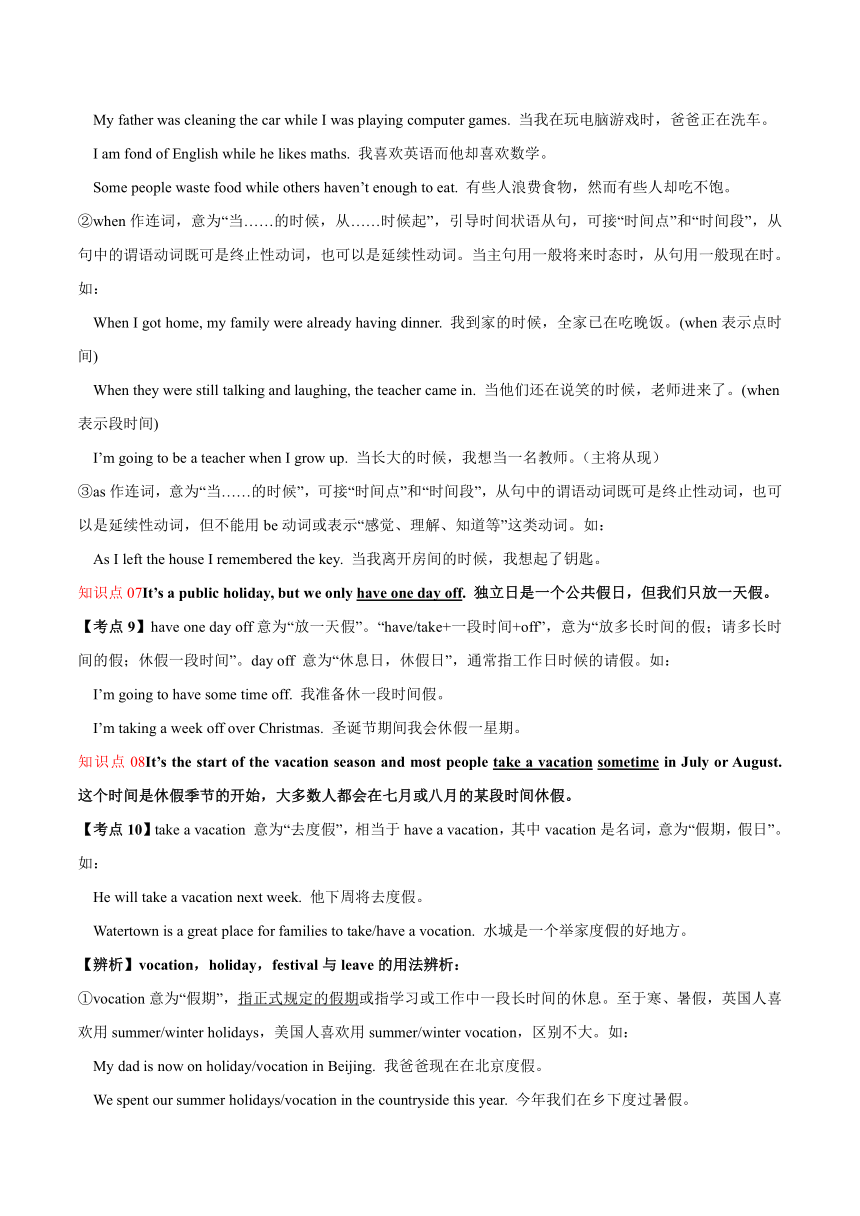
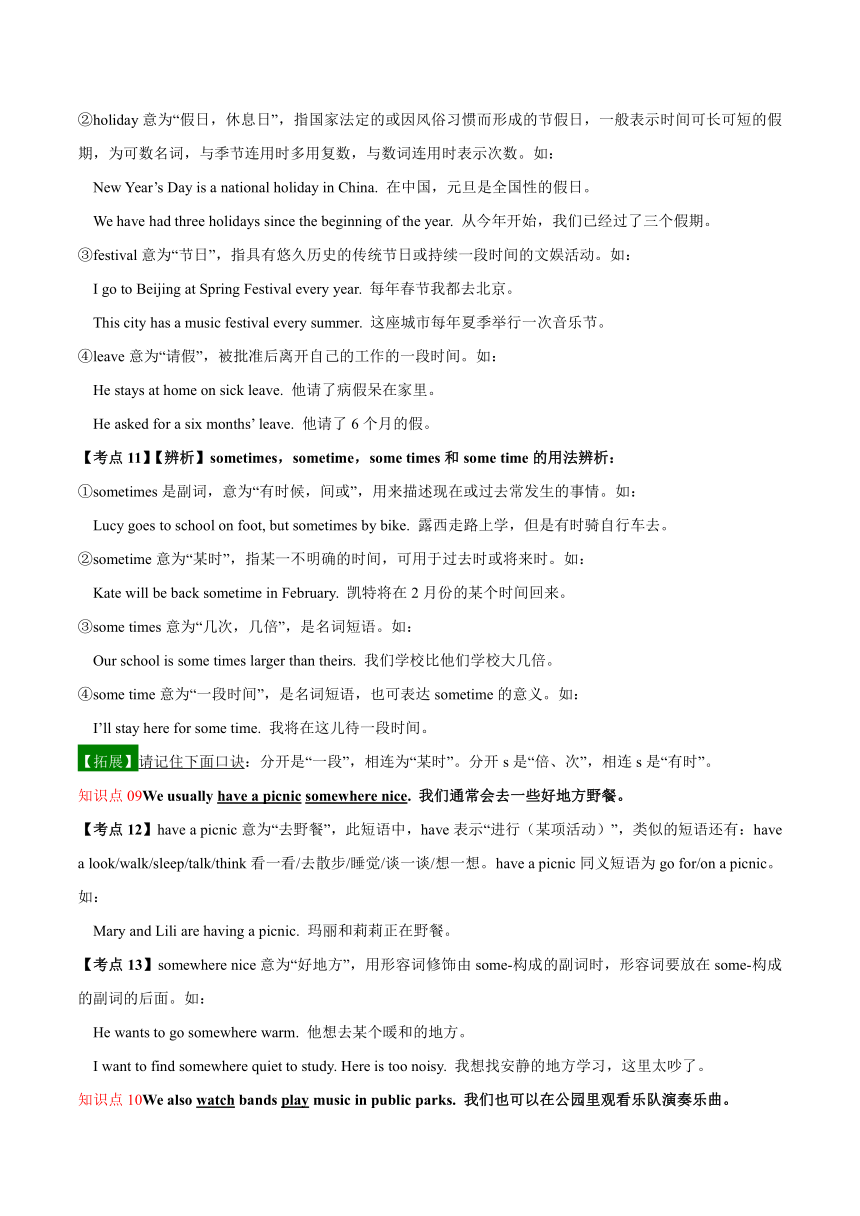
文档简介
Module 2 Unit 1
My family always go somewhere interesting as soon as the holiday begins
知识点01The First of October is China’s National Day, isn’t it, Lingling 玲玲,10月1日是中国的国庆节,对吗?
【考点1】the First of October 意为“十月一号”。英语年月日的表达“在英国英语中,通常可有两种表达法。以“1988年5月2日”为例:表达法①:写法:(the) 2 (nd) May, 1988;读法:the second of May, nineteen eighty-eight;表达法②:写法:May (the) 2 (nd), 1988;读法:May the second, nineteen eighty-eight。如:
I was born on March 6th, 1990. 我出生于1990年3 月6日。
读成:I was born on March the sixth, nineteen ninety. 或I was born on the sixth of March, nineteen ninety.
【拓展】①写法中,日期与月份之间不可加逗号;②写法中,年份前的逗号可以省略;③写法中,代表日期的序数词词尾(-st,-nd,-rd或-th)均可省略;④写法中,序数词前的定冠词the,一般可省略(尤其是以序数词开头的场合);但在读法中,该定冠词则不省略。
【考点2】本句是反意疑问句。在陈述句之后,附加上一个简短问句,对陈述句所述的事情提出相反的疑问,这种疑问句叫作反意疑问句。反意疑问句由“陈述句+附加疑问句”两部分构成。反意疑问句的结构有两种:前肯后否;前否后肯。后简短问句由“助动词/情态动词/be(或者是他们的否定形式)+与主语相对应的代词”,助动/情态动词/be在时态上要与前面的陈述句保持一致,在人称和数上与后面的代词(主语)保持一致。如:
He is late, isn’t he 他迟到了,不是吗?// He didn’t have lunch, did he 他没有吃午饭,对吗?
【拓展】在回答反意疑问句的时候,如果是前肯后否的句子,思维和中国人相同;如果是前否后肯的句子,思维正好同中国人相反,坚持“Yes+肯定的简短回答”或“No+否定的简短回答”。答语中的yes翻译成“不”, 答语中的no翻译成“是”。(巧记:肯否交叉,二谓一致;不管问法,事实回答。)如:
---- He is a student, isn’t he 他是个学生,不是吗?
---- Yes, he is. 是的,他是学生。// ---- No, he isn’t. 不是,他不是学生。
---- I am not a teacher, am I 我不是一名老师,是吗?
---- Yes, I am. 不,我是一名老师。// ---- No, I am not. 是,我不是一名老师。
知识点02The People’s Republic of China was founded on 1st October 1949. 中华人民共和国成立于1949年10月1日。
【考点3】found意为“创立,创建”,后可接学校、城堡、医院、公司、机构、组织、国家等名词或代词作宾语。它的过去式和过去分词都加-ed。found还是find的过去式和过去分词,意为“找到”。如:
The town was founded in 1610. 这个镇建于1610年。
I found a wallet on the ground. 我在地上发现一个钱包。
【辨析】found,build,put up与set up的用法辨析:
①found意为“创立,创建”,指创立一个组织、机构、国家等。如:
They founded (=built) a school for the blind. 他们创办了一亿盲人学校。
The People’s Republic of China was founded in 1949. 中华人民共和国成立于是1949年。
②build意为“建筑、建造”指施工建筑,如房屋、桥梁、道路等的建造,也可用于广义。如:
We are building socialism with China’s style. 我们正在建设具有中国特色的社会主义。
③put up 和set up 人含义很多,但他们在表示“搭起、竖起、挂起”以及表建筑物“建起”的意思时,可以通用。只不过put up 比set up 要常见些。但set up 在表示“建起、成立”某一机构团体时,不能用put up 替换。如:
The boys put up (set up) their tents in the woods. 孩子们在树林里搭起了帐篷。
They have put up (set up) several cattle sheds for the team. 他们为队里建造了几个牛棚。
The factory set up a night school last month. 这个工厂上月成立了一所夜校。
【考点4】【辨析】in,on与at表示时间的用法辨析:
①on用在具体的某一天(如星期、日期或节日)或者某一天的上午、下午或晚上前。如:
on Monday;on the morning of June 1st;on a cold day;on Monday;on July 1st;on Sunday morning 等。
②in用在世纪,季节,年,月,周或某一日中的上午、下午、晚上前。如:
in summer;in 2013;in May;in winter;in the morn ing;in the afternoon;in the evening;in three days等。
③at用在某个时刻(几点钟)或黎明、正午、黄昏、午夜前。如:
at 7:00;at dawn;at noon;at dusk;at midnight等。
【拓展】this, that, last, next, every, yesterday, tomorrow等词用在morning, afternoon, night及星期的七个词前一律不能加介词。如:I went to Hangzhou last Sunday. 我上周去了杭州。
知识点03People have celebrated the National Day since then. 从那时开始,中国人(每年)都庆祝国庆节。
【考点5】since then意为“从那以后”。是现在完成时的标志。since作介词或连词,意为“自从;自……以来”,后面接表示时间的词或短语,引导时间状语从句,主句用现在完成时,而且谓语动词须是延续性动词。如:
We have been friends since childhood. 我们从小就一直是朋友。
He has lived in Beijing since then. 从那以后他就一直住在北京。
Since we came here, we have lived in the house. 自从我们来这儿,我们就住在这座房子里。
【拓展】since还可以意为“既然……”,引导原因状语从句,表示原因是对方已知的,相当于now that,语气比because弱。如:
Since the rain has stopped, let’s go for a walk. 既然雨停了,我们出去散散步吧。
知识点04There are flowers and national flags everywhere, and we have a three-day holiday. (国庆节时)到处都有鲜花和国旗,我们休假3天。
【考点6】have a three-day holiday意为“休假3天”。three-day 是一个合成形容词,它有两个特点:中间必须有“-”;后面的名词必须用单数。它相当于形容词,可作定语修饰名词。如:
Tom has just finished writing a 900-word article. 汤姆刚刚写完了一篇900字的文章。
【拓展】类似的合成形容词还有:“数词+连字符+单数名词+连字符+形容词”或“数词+连字符+名词+-ed”。如:
50-year-old 50岁的;10-metre-long 10米长的;5-metre-tall 5米高的;one-eyed 一只眼的。
知识点05My parents and I are going to visit some friends in Shandong Province and will stay there until the end of the holiday. 我和爸爸妈妈准备去山东省拜访一些朋友。我们会一直待在那里,直至假期结束。
【考点7】until 作介词或连词,意为“到……为止,直到”,表示动作或状态一直持续到某一时刻。其用法如下:
①until 作介词或连词,意为“到……为止,直到”,until引导时间状语或时间状语从句时,主句中的谓语动词必须用延续性动词,如果主句用将来时态或祈使句,until引导的从句必须用一般现在时表将来。如:
I’ll wait until they arrive. 我会一直等到他们来。(until引导时间状语从句,为连词)
He waited until his mother came back. 他一直等到他母亲回来。(until引导时间状语从句,为连词)
Sometimes I do my homework until 10 at night. 有时我做作业直到晚上10点。(until引导时间状语,为介词)
②not...until... 意为“直到……才……”。表示主语的动作在某一时间或某一动作之前没有发生,其中until可以用till代替。在not...until...结构中,主句的谓语动词是终止性动词。如:
They didn’t leave until/till I arrived. 直到我到达,他们才离开。
I didn’t wake up until/till I heard the alarm clock. 直到听到闹钟的铃声我才醒来。
知识点06While we’re staying with our friends, we’re going to spend one day in Qingdao. 和朋友们在一起期间,我们会去青岛玩一天。
【考点8】【辨析】while,when与as的用法辨析:
①while作连词,意为“当……的时候”,引导时间状语从句,强调某一段时间内主从句动作同时发生,或主句动作在从句持续过程中的某一时刻发生,且从句的谓语动词应该是延续性动词或表示状态的词;while还可用作并列连词,意为“而,然而”,表示对比(照)。如:
While she was listening to the radio, she fell asleep. 她听着收音机睡着了。
She fell asleep while she was reading the newspaper. 她在看报的时候睡着了。
My father was cleaning the car while I was playing computer games. 当我在玩电脑游戏时,爸爸正在洗车。
I am fond of English while he likes maths. 我喜欢英语而他却喜欢数学。
Some people waste food while others haven’t enough to eat. 有些人浪费食物,然而有些人却吃不饱。
②when作连词,意为“当……的时候,从……时候起”,引导时间状语从句,可接“时间点”和“时间段”,从句中的谓语动词既可是终止性动词,也可以是延续性动词。当主句用一般将来时态时,从句用一般现在时。如:
When I got home, my family were already having dinner. 我到家的时候,全家已在吃晚饭。(when表示点时间)
When they were still talking and laughing, the teacher came in. 当他们还在说笑的时候,老师进来了。(when表示段时间)
I’m going to be a teacher when I grow up. 当长大的时候,我想当一名教师。(主将从现)
③as作连词,意为“当……的时候”,可接“时间点”和“时间段”,从句中的谓语动词既可是终止性动词,也可以是延续性动词,但不能用be动词或表示“感觉、理解、知道等”这类动词。如:
As I left the house I remembered the key. 当我离开房间的时候,我想起了钥匙。
知识点07It’s a public holiday, but we only have one day off. 独立日是一个公共假日,但我们只放一天假。
【考点9】have one day off意为“放一天假”。“have/take+一段时间+off”,意为“放多长时间的假;请多长时间的假;休假一段时间”。day off 意为“休息日,休假日”,通常指工作日时候的请假。如:
I’m going to have some time off. 我准备休一段时间假。
I’m taking a week off over Christmas. 圣诞节期间我会休假一星期。
知识点08It’s the start of the vacation season and most people take a vacation sometime in July or August. 这个时间是休假季节的开始,大多数人都会在七月或八月的某段时间休假。
【考点10】take a vacation 意为“去度假”,相当于have a vacation,其中vacation是名词,意为“假期,假日”。如:
He will take a vacation next week. 他下周将去度假。
Watertown is a great place for families to take/have a vocation. 水城是一个举家度假的好地方。
【辨析】vocation,holiday,festival与leave的用法辨析:
①vocation意为“假期”,指正式规定的假期或指学习或工作中一段长时间的休息。至于寒、暑假,英国人喜欢用summer/winter holidays,美国人喜欢用summer/winter vocation,区别不大。如:
My dad is now on holiday/vocation in Beijing. 我爸爸现在在北京度假。
We spent our summer holidays/vocation in the countryside this year. 今年我们在乡下度过暑假。
②holiday意为“假日,休息日”,指国家法定的或因风俗习惯而形成的节假日,一般表示时间可长可短的假期,为可数名词,与季节连用时多用复数,与数词连用时表示次数。如:
New Year’s Day is a national holiday in China. 在中国,元旦是全国性的假日。
We have had three holidays since the beginning of the year. 从今年开始,我们已经过了三个假期。
③festival意为“节日”,指具有悠久历史的传统节日或持续一段时间的文娱活动。如:
I go to Beijing at Spring Festival every year. 每年春节我都去北京。
This city has a music festival every summer. 这座城市每年夏季举行一次音乐节。
④leave意为“请假”,被批准后离开自己的工作的一段时间。如:
He stays at home on sick leave. 他请了病假呆在家里。
He asked for a six months’ leave. 他请了6个月的假。
【考点11】【辨析】sometimes,sometime,some times和some time的用法辨析:
①sometimes是副词,意为“有时候,间或”,用来描述现在或过去常发生的事情。如:
Lucy goes to school on foot, but sometimes by bike. 露西走路上学,但是有时骑自行车去。
②sometime意为“某时”,指某一不明确的时间,可用于过去时或将来时。如:
Kate will be back sometime in February. 凯特将在2月份的某个时间回来。
③some times意为“几次,几倍”,是名词短语。如:
Our school is some times larger than theirs. 我们学校比他们学校大几倍。
④some time意为“一段时间”,是名词短语,也可表达sometime的意义。如:
I’ll stay here for some time. 我将在这儿待一段时间。
【拓展】请记住下面口诀:分开是“一段”,相连为“某时”。分开s是“倍、次”,相连s是“有时”。
知识点09We usually have a picnic somewhere nice. 我们通常会去一些好地方野餐。
【考点12】have a picnic意为“去野餐”,此短语中,have表示“进行(某项活动)”,类似的短语还有:have a look/walk/sleep/talk/think看一看/去散步/睡觉/谈一谈/想一想。have a picnic同义短语为go for/on a picnic。如:
Mary and Lili are having a picnic. 玛丽和莉莉正在野餐。
【考点13】somewhere nice意为“好地方”,用形容词修饰由some-构成的副词时,形容词要放在some-构成的副词的后面。如:
He wants to go somewhere warm. 他想去某个暖和的地方。
I want to find somewhere quiet to study. Here is too noisy. 我想找安静的地方学习,这里太吵了。
知识点10We also watch bands play music in public parks. 我们也可以在公园里观看乐队演奏乐曲。
【考点14】【辨析】watch sb. do sth.与watch sb. doing sth.的用法辨析:
①watch sb. do sth. 意为“观看某人做某事”。强调观看了事情的全过程,动作已经结束,或“观看某人经常做某事”,是省略to的动词不定式作宾语补足语。类似用法的有see/hear/notice sb. do sth.等。如:
I heard her sing. 我听见她唱了歌。
I saw him get on the bus. 我看见他上了公共汽车。
It’s always interesting to watch other people show their talents. 观看别人展示他们的天赋总是很有趣。
②watch sb. doing sth. 意为“观看某人正在做某事”。强调观看的动作正在进行,此处是现在分词作宾语补足语。类似用法的有see/hear/notice sb. doing sth.等。如:
I’m watching them playing football. 我正在观看他们踢足球。
I saw him getting on the bus. 我看见他正在上公共汽车。// I heard her singing. 我听见她正在唱歌。
【拓展】英语中有些动词跟省略to的动词不定式作宾语补足语,这类动词可用下列口诀记忆:不定式,作宾补,下列词后省略to;一感、二听、三让、四看,半帮助;若是宾补变主补,to字一定要回府。“一感”指feel;“二听”指hear, listen to;“三让”指have, let, make;“四看”指see, watch, notice和look at;“半帮助”指动词不定式作help的宾语补足语时to可要也可不要。在原宾语补足语变主语补足语时,要把to补回来。
知识点11Kids have great fun. 孩子们玩得可开心了。
【考点15】have fun=enjoy oneself=have a wonderful/great/good time意为“玩的开心,玩的愉快”,fun为不可数名词,前面不加冠词。短语:have great fun (in) doing sth. 意为“做某事很开心”。如:
We enjoyed ourselves in the park yesterday. 昨天我们在公园里玩得高兴。
Did you have great fun on my birthday party 你在我的生日聚会上玩的开心吗?
The kids are having great fun playing in the park now. 孩子们现在在公园里玩得很开心。
知识点12And my family always go somewhere interesting as soon as the holiday begins. 假期一开始,我们一家就会去某个好玩的地方。
【考点16】as soon as意为“一……就……”,引导时间状语从句,强调两个动作接连发生,从句中的谓语动词常为短暂性动词;as soon as引导从句时,如果主句用将来时态或祈使句,从句常用一般现在时表将来。如:
Please call me as soon as you get to the hotel. 你一回到酒店就给我打电话。
If it doesn’t rain, we will have a picnic tomorrow. 明天如果不下雨,我们就去野炊。
We’ll go back to school as soon as the May Day holiday is over. 五一假期一结束,我们就回学校。
As soon as his father went out, the boy ran to the cinema. 爸爸刚出门,那男孩就跑向电影院。
知识点13序数词的构成及用法
【考点17】序数词构成巧记:序数词很好记,基数词后再加th;8少t 9去e,面目全非1/2/3;ve结尾5和2(12),换成f须仔细;若是几十几的数,前半基来后半序;遇到ty结尾词,把y变ie再加th。如:
one→first, two→second, three→third, five→fifth, eight→eighth, nine→ninth, twelve→twelfth, twenty→twentieth;thirty-one→thirty-first为特殊形式,其它的序数词都是由其相对应的基数词后面添加“th”构成。
【考点18】序数词的用法:序数词在使用时,通常前面要加定冠词the;但序数词前有物主代词或名词所有格时,前面不要加定冠词the;用于最高级前;用于表达分数的分母(子基母序),分子用基数词,分母用序数词,分子大于“1”,分母则加“s”;如果序数词前出现不定冠词a或an时,表示“又一,再一”;在编号时,序号在前用序数词,序号在后用基数词表示;年月日的表示:年用基数词,日用序数词;带分数的词组作句子的主语时,谓语动词的单复数与分数后的名词保持一致。如:
The eighth of March is Women’s Day. 三月八号是妇女节。(主语)
Mother was my first teacher in my life. 妈妈是我生命中的第一个老师。
Three sevenths of the pear is eaten. 这个梨子被吃了七分之三。
Three sevenths of the pears are yellow. 梨子的七分之三是黄色的。
We have tried it four times. Must we try it a fifth time 我们已经试过了四次,我们还必须再试一次吗?
题组A 基础过关练
Ⅰ.从括号中选择适当的单词填空
1.He is the (sixth/six)tallest boy in our class.
2. (Chinese/China's)National Day is celebrated on 1st October every year.
3.My father was born (on/in)1st October.
4.Last week,I had a wonderful (five day/five days)holiday in London.
5.We stayed in the countryside with my grandparents (some time/sometime)last year.
【答案】1.sixth2.China's3.on4.five day5.some time
Ⅱ.用方框中所给单词或短语的适当形式填空
1. we're staying with them,we're going to spend a few days in Qingdao.
2.It's the last day the new school year begins.
3. September comes,it starts to get cooler.
4.We will go to the West Lake the holiday begins.
5.Wang Kai remained an unknown actor for many years Ode to Joy spoke for him.
6.We also go back to school the May Day holiday is over.
7.We only have a few weeks the start of the summer holidays.
8. the weather is fine,many families go out for a walk.
9. they're waiting for the New Year,they listen to music,sing traditional songs and have fun.
10.What are you going to do you finish college
【答案】
1.While/When2.before3.When4.as soon as5.until6.after7.before8.When9.While/When10.after
题组B 能力提升练
词汇运用
A.用方框中所给单词的适当形式填空。每词仅用一次,每空一词。
1.Friday is the day of a week.
2.I like summer best of all the .
3.We have at the flag raising ceremony(仪式)every Monday morning.
4.The organization was in 2015.
5.—Judy,you look so tired.
—Yes,I didn't go to bed it was 12 o'clock last night.
【答案】1.sixth2.seasons3.fun4.founded5.until
B.根据短文内容和括号内所给汉语意思,写出空白处各单词的正确形式(每空一词)。
A Visit to a Farm
There is a travel agency(旅行社)in our building.It was __6__(创立)in 2012 and it has provided all kinds of activities since then.People working in the travel agency are busy during the vacation __7__(节期).Last month the travel agency celebrated its fourth birthday,so it had more special activities.
I had three days __8__(休息)last month,so I wanted to take a vacation.Then I booked at the travel agency.There were twenty people in my group.When I got to the meeting place,I found I was the __9__(第九)and the travel agency gave everyone its red flag.I was very happy to see the tenth person.He is my friend.When the __10__(第二十)person arrived,we set off for a famous farm.
As we came near the farm,we saw fields of corn.On the farm,a farmer gave a __11__(演讲).He told us the history of the farm.Years ago,some pioneers came here to grow corn and later it became a famous farm.Then we had lunch with the farmers together.Oh,I helped __12__(摆放)the table.The dishes were beautiful and the food was very delicious.When lunch was __13__(结束),we saw some kids dance in a square.They had fun there.There was also a band from the UK.They played music for the visitors.
In the __14__(接下来的)days,we just worked on the farm with the farmers.We had another kind of life.And we enjoyed __15__(我们自己)there!
【答案】
6.founded7.season8.off9.ninth10.twentieth11.speech12.lay13.finished/over14.following15.ourselves
题组C 培优拔尖练
一
阅读下面短文,按照句子结构的语法性和上下文连贯的要求,在空白处填入一个适当的词或使用括号中词语的正确形式填空。
Christmas is a Christian holiday that celebrates the birth of Jesus Christ.In the 4th century it was __1__ holiday for the church.By the 12th century,Christmas had become the __2__(important)religious festival in Europe.In the 19th century,two Christmas customs __3__(become)popular—decorating(装饰)Christmas trees and sending Christmas cards __4__ relatives and friends.Many well known Christmas songs __5__(write)during that time.
For most people who celebrate Christmas,it is a special holiday for family and friends __6__(get)together,enjoy delicious food and give gifts.A traditional Christmas dinner in America includes stuffed turkey,mashed potatoes __7__ so on.One of the most important __8__(tradition)is receiving gifts from Santa Claus.Today,Santa Claus __9__(bring)presents to children in many countries,__10__(include)the United States,Canada,Great Britain and Australia.
【答案】1.a2.most important3.became4.to5.were written6.to get7.and8.traditions9.brings10.including
二
A 12-year-old girl from Virginia, US, never thought that a simple message she put online could bring her big problems. She posted the words,“Killing. Meet me in the library Tuesday”, with three emojis(表情符号)of a gun, a knife and a bomb(炸弹)on Instagram, a social media(社交媒体). She was told that she broke the law because of threatening(威胁)her school.
This problem is not far away from us. Not long ago, Ni Hanxiang, a Chinese student at a university in the US, was sent back to China after expressing on social media that he would kill his teachers if he failed to pass his exams.
In China, posting threatening words online is also against the law. In 2013, Wu Hongfei, a singer, got into trouble for saying on Weibo that she wanted to blow up a building.
“Threatening happens not only face to face but also through the Internet, social media and the telephone,”said Mr.Cao, a lawyer from Chongqing.“Although the law of China protects people;s right of free speech, it doesn t include words that threaten others’ lives and national safety.”
“Some people may not mean to threaten. They may just be trying to say‘I’m strong’,”said Fred Pratt, a lawyer from the US.
The girl’s mother said her daughter was a good kid who had never been in trouble before. Ni Hanxiang also said he didn’t realize that what he put online was so serious.
“But not knowing the law doesn’t mean the law will treat you any differently if you break it,”says David Allen Green, a lawyer from the UK. So, do you think we’d better spend a minute or two thinking about the words or emojis we use on social media before we press“send”
1.The 12-year-old girl from Virginia put the words“Killing. Meet me in the library Tuesday”, with three emojis .
A.in her own diary
B.in a letter to her friend
C.on a social media
D.on the wall of the library
2.Ni Hanxiang was sent back to China .
A.because he broke the US law
B.because he wasn’t honest
C.after he killed his teachers
D.after he blew up a building
3.From this passage, we can infer(推断)that .
A.Fred Pratt thinks some people may not mean to threaten
B.the girl’s mother didn’t think her daughter was a bad child
C.cheating in an examination at school may get you into trouble
D.putting threatening words on QQ may bring you problems
4.This passage mainly wants to tell us that .
A.we shouldn’t break the US law if we study at a university in the US
B.students and singers shouldn’t post words or emojis on social media
C.students should study hard at school and not use the Internet too much
D.we should be careful when we send words or emojis on social media
1.【答案】C
【解析】细节理解题。由第一段第二句可知,她是在一个社交媒体上发表的。
2.【答案】A
【解析】推理判断题。由第一段最后一句中“broke the law”和第二段可以推断出他触犯了美国法律。
3.【答案】D
【解析】推理判断题。由文中举的事例可以推断出在QQ上发表恐吓言论可能会给自己带来麻烦。
4.【答案】D
【解析】主旨大意题。全文讲的是在社交媒体上发表言论应该慎重,故D项正确。
My family always go somewhere interesting as soon as the holiday begins
知识点01The First of October is China’s National Day, isn’t it, Lingling 玲玲,10月1日是中国的国庆节,对吗?
【考点1】the First of October 意为“十月一号”。英语年月日的表达“在英国英语中,通常可有两种表达法。以“1988年5月2日”为例:表达法①:写法:(the) 2 (nd) May, 1988;读法:the second of May, nineteen eighty-eight;表达法②:写法:May (the) 2 (nd), 1988;读法:May the second, nineteen eighty-eight。如:
I was born on March 6th, 1990. 我出生于1990年3 月6日。
读成:I was born on March the sixth, nineteen ninety. 或I was born on the sixth of March, nineteen ninety.
【拓展】①写法中,日期与月份之间不可加逗号;②写法中,年份前的逗号可以省略;③写法中,代表日期的序数词词尾(-st,-nd,-rd或-th)均可省略;④写法中,序数词前的定冠词the,一般可省略(尤其是以序数词开头的场合);但在读法中,该定冠词则不省略。
【考点2】本句是反意疑问句。在陈述句之后,附加上一个简短问句,对陈述句所述的事情提出相反的疑问,这种疑问句叫作反意疑问句。反意疑问句由“陈述句+附加疑问句”两部分构成。反意疑问句的结构有两种:前肯后否;前否后肯。后简短问句由“助动词/情态动词/be(或者是他们的否定形式)+与主语相对应的代词”,助动/情态动词/be在时态上要与前面的陈述句保持一致,在人称和数上与后面的代词(主语)保持一致。如:
He is late, isn’t he 他迟到了,不是吗?// He didn’t have lunch, did he 他没有吃午饭,对吗?
【拓展】在回答反意疑问句的时候,如果是前肯后否的句子,思维和中国人相同;如果是前否后肯的句子,思维正好同中国人相反,坚持“Yes+肯定的简短回答”或“No+否定的简短回答”。答语中的yes翻译成“不”, 答语中的no翻译成“是”。(巧记:肯否交叉,二谓一致;不管问法,事实回答。)如:
---- He is a student, isn’t he 他是个学生,不是吗?
---- Yes, he is. 是的,他是学生。// ---- No, he isn’t. 不是,他不是学生。
---- I am not a teacher, am I 我不是一名老师,是吗?
---- Yes, I am. 不,我是一名老师。// ---- No, I am not. 是,我不是一名老师。
知识点02The People’s Republic of China was founded on 1st October 1949. 中华人民共和国成立于1949年10月1日。
【考点3】found意为“创立,创建”,后可接学校、城堡、医院、公司、机构、组织、国家等名词或代词作宾语。它的过去式和过去分词都加-ed。found还是find的过去式和过去分词,意为“找到”。如:
The town was founded in 1610. 这个镇建于1610年。
I found a wallet on the ground. 我在地上发现一个钱包。
【辨析】found,build,put up与set up的用法辨析:
①found意为“创立,创建”,指创立一个组织、机构、国家等。如:
They founded (=built) a school for the blind. 他们创办了一亿盲人学校。
The People’s Republic of China was founded in 1949. 中华人民共和国成立于是1949年。
②build意为“建筑、建造”指施工建筑,如房屋、桥梁、道路等的建造,也可用于广义。如:
We are building socialism with China’s style. 我们正在建设具有中国特色的社会主义。
③put up 和set up 人含义很多,但他们在表示“搭起、竖起、挂起”以及表建筑物“建起”的意思时,可以通用。只不过put up 比set up 要常见些。但set up 在表示“建起、成立”某一机构团体时,不能用put up 替换。如:
The boys put up (set up) their tents in the woods. 孩子们在树林里搭起了帐篷。
They have put up (set up) several cattle sheds for the team. 他们为队里建造了几个牛棚。
The factory set up a night school last month. 这个工厂上月成立了一所夜校。
【考点4】【辨析】in,on与at表示时间的用法辨析:
①on用在具体的某一天(如星期、日期或节日)或者某一天的上午、下午或晚上前。如:
on Monday;on the morning of June 1st;on a cold day;on Monday;on July 1st;on Sunday morning 等。
②in用在世纪,季节,年,月,周或某一日中的上午、下午、晚上前。如:
in summer;in 2013;in May;in winter;in the morn ing;in the afternoon;in the evening;in three days等。
③at用在某个时刻(几点钟)或黎明、正午、黄昏、午夜前。如:
at 7:00;at dawn;at noon;at dusk;at midnight等。
【拓展】this, that, last, next, every, yesterday, tomorrow等词用在morning, afternoon, night及星期的七个词前一律不能加介词。如:I went to Hangzhou last Sunday. 我上周去了杭州。
知识点03People have celebrated the National Day since then. 从那时开始,中国人(每年)都庆祝国庆节。
【考点5】since then意为“从那以后”。是现在完成时的标志。since作介词或连词,意为“自从;自……以来”,后面接表示时间的词或短语,引导时间状语从句,主句用现在完成时,而且谓语动词须是延续性动词。如:
We have been friends since childhood. 我们从小就一直是朋友。
He has lived in Beijing since then. 从那以后他就一直住在北京。
Since we came here, we have lived in the house. 自从我们来这儿,我们就住在这座房子里。
【拓展】since还可以意为“既然……”,引导原因状语从句,表示原因是对方已知的,相当于now that,语气比because弱。如:
Since the rain has stopped, let’s go for a walk. 既然雨停了,我们出去散散步吧。
知识点04There are flowers and national flags everywhere, and we have a three-day holiday. (国庆节时)到处都有鲜花和国旗,我们休假3天。
【考点6】have a three-day holiday意为“休假3天”。three-day 是一个合成形容词,它有两个特点:中间必须有“-”;后面的名词必须用单数。它相当于形容词,可作定语修饰名词。如:
Tom has just finished writing a 900-word article. 汤姆刚刚写完了一篇900字的文章。
【拓展】类似的合成形容词还有:“数词+连字符+单数名词+连字符+形容词”或“数词+连字符+名词+-ed”。如:
50-year-old 50岁的;10-metre-long 10米长的;5-metre-tall 5米高的;one-eyed 一只眼的。
知识点05My parents and I are going to visit some friends in Shandong Province and will stay there until the end of the holiday. 我和爸爸妈妈准备去山东省拜访一些朋友。我们会一直待在那里,直至假期结束。
【考点7】until 作介词或连词,意为“到……为止,直到”,表示动作或状态一直持续到某一时刻。其用法如下:
①until 作介词或连词,意为“到……为止,直到”,until引导时间状语或时间状语从句时,主句中的谓语动词必须用延续性动词,如果主句用将来时态或祈使句,until引导的从句必须用一般现在时表将来。如:
I’ll wait until they arrive. 我会一直等到他们来。(until引导时间状语从句,为连词)
He waited until his mother came back. 他一直等到他母亲回来。(until引导时间状语从句,为连词)
Sometimes I do my homework until 10 at night. 有时我做作业直到晚上10点。(until引导时间状语,为介词)
②not...until... 意为“直到……才……”。表示主语的动作在某一时间或某一动作之前没有发生,其中until可以用till代替。在not...until...结构中,主句的谓语动词是终止性动词。如:
They didn’t leave until/till I arrived. 直到我到达,他们才离开。
I didn’t wake up until/till I heard the alarm clock. 直到听到闹钟的铃声我才醒来。
知识点06While we’re staying with our friends, we’re going to spend one day in Qingdao. 和朋友们在一起期间,我们会去青岛玩一天。
【考点8】【辨析】while,when与as的用法辨析:
①while作连词,意为“当……的时候”,引导时间状语从句,强调某一段时间内主从句动作同时发生,或主句动作在从句持续过程中的某一时刻发生,且从句的谓语动词应该是延续性动词或表示状态的词;while还可用作并列连词,意为“而,然而”,表示对比(照)。如:
While she was listening to the radio, she fell asleep. 她听着收音机睡着了。
She fell asleep while she was reading the newspaper. 她在看报的时候睡着了。
My father was cleaning the car while I was playing computer games. 当我在玩电脑游戏时,爸爸正在洗车。
I am fond of English while he likes maths. 我喜欢英语而他却喜欢数学。
Some people waste food while others haven’t enough to eat. 有些人浪费食物,然而有些人却吃不饱。
②when作连词,意为“当……的时候,从……时候起”,引导时间状语从句,可接“时间点”和“时间段”,从句中的谓语动词既可是终止性动词,也可以是延续性动词。当主句用一般将来时态时,从句用一般现在时。如:
When I got home, my family were already having dinner. 我到家的时候,全家已在吃晚饭。(when表示点时间)
When they were still talking and laughing, the teacher came in. 当他们还在说笑的时候,老师进来了。(when表示段时间)
I’m going to be a teacher when I grow up. 当长大的时候,我想当一名教师。(主将从现)
③as作连词,意为“当……的时候”,可接“时间点”和“时间段”,从句中的谓语动词既可是终止性动词,也可以是延续性动词,但不能用be动词或表示“感觉、理解、知道等”这类动词。如:
As I left the house I remembered the key. 当我离开房间的时候,我想起了钥匙。
知识点07It’s a public holiday, but we only have one day off. 独立日是一个公共假日,但我们只放一天假。
【考点9】have one day off意为“放一天假”。“have/take+一段时间+off”,意为“放多长时间的假;请多长时间的假;休假一段时间”。day off 意为“休息日,休假日”,通常指工作日时候的请假。如:
I’m going to have some time off. 我准备休一段时间假。
I’m taking a week off over Christmas. 圣诞节期间我会休假一星期。
知识点08It’s the start of the vacation season and most people take a vacation sometime in July or August. 这个时间是休假季节的开始,大多数人都会在七月或八月的某段时间休假。
【考点10】take a vacation 意为“去度假”,相当于have a vacation,其中vacation是名词,意为“假期,假日”。如:
He will take a vacation next week. 他下周将去度假。
Watertown is a great place for families to take/have a vocation. 水城是一个举家度假的好地方。
【辨析】vocation,holiday,festival与leave的用法辨析:
①vocation意为“假期”,指正式规定的假期或指学习或工作中一段长时间的休息。至于寒、暑假,英国人喜欢用summer/winter holidays,美国人喜欢用summer/winter vocation,区别不大。如:
My dad is now on holiday/vocation in Beijing. 我爸爸现在在北京度假。
We spent our summer holidays/vocation in the countryside this year. 今年我们在乡下度过暑假。
②holiday意为“假日,休息日”,指国家法定的或因风俗习惯而形成的节假日,一般表示时间可长可短的假期,为可数名词,与季节连用时多用复数,与数词连用时表示次数。如:
New Year’s Day is a national holiday in China. 在中国,元旦是全国性的假日。
We have had three holidays since the beginning of the year. 从今年开始,我们已经过了三个假期。
③festival意为“节日”,指具有悠久历史的传统节日或持续一段时间的文娱活动。如:
I go to Beijing at Spring Festival every year. 每年春节我都去北京。
This city has a music festival every summer. 这座城市每年夏季举行一次音乐节。
④leave意为“请假”,被批准后离开自己的工作的一段时间。如:
He stays at home on sick leave. 他请了病假呆在家里。
He asked for a six months’ leave. 他请了6个月的假。
【考点11】【辨析】sometimes,sometime,some times和some time的用法辨析:
①sometimes是副词,意为“有时候,间或”,用来描述现在或过去常发生的事情。如:
Lucy goes to school on foot, but sometimes by bike. 露西走路上学,但是有时骑自行车去。
②sometime意为“某时”,指某一不明确的时间,可用于过去时或将来时。如:
Kate will be back sometime in February. 凯特将在2月份的某个时间回来。
③some times意为“几次,几倍”,是名词短语。如:
Our school is some times larger than theirs. 我们学校比他们学校大几倍。
④some time意为“一段时间”,是名词短语,也可表达sometime的意义。如:
I’ll stay here for some time. 我将在这儿待一段时间。
【拓展】请记住下面口诀:分开是“一段”,相连为“某时”。分开s是“倍、次”,相连s是“有时”。
知识点09We usually have a picnic somewhere nice. 我们通常会去一些好地方野餐。
【考点12】have a picnic意为“去野餐”,此短语中,have表示“进行(某项活动)”,类似的短语还有:have a look/walk/sleep/talk/think看一看/去散步/睡觉/谈一谈/想一想。have a picnic同义短语为go for/on a picnic。如:
Mary and Lili are having a picnic. 玛丽和莉莉正在野餐。
【考点13】somewhere nice意为“好地方”,用形容词修饰由some-构成的副词时,形容词要放在some-构成的副词的后面。如:
He wants to go somewhere warm. 他想去某个暖和的地方。
I want to find somewhere quiet to study. Here is too noisy. 我想找安静的地方学习,这里太吵了。
知识点10We also watch bands play music in public parks. 我们也可以在公园里观看乐队演奏乐曲。
【考点14】【辨析】watch sb. do sth.与watch sb. doing sth.的用法辨析:
①watch sb. do sth. 意为“观看某人做某事”。强调观看了事情的全过程,动作已经结束,或“观看某人经常做某事”,是省略to的动词不定式作宾语补足语。类似用法的有see/hear/notice sb. do sth.等。如:
I heard her sing. 我听见她唱了歌。
I saw him get on the bus. 我看见他上了公共汽车。
It’s always interesting to watch other people show their talents. 观看别人展示他们的天赋总是很有趣。
②watch sb. doing sth. 意为“观看某人正在做某事”。强调观看的动作正在进行,此处是现在分词作宾语补足语。类似用法的有see/hear/notice sb. doing sth.等。如:
I’m watching them playing football. 我正在观看他们踢足球。
I saw him getting on the bus. 我看见他正在上公共汽车。// I heard her singing. 我听见她正在唱歌。
【拓展】英语中有些动词跟省略to的动词不定式作宾语补足语,这类动词可用下列口诀记忆:不定式,作宾补,下列词后省略to;一感、二听、三让、四看,半帮助;若是宾补变主补,to字一定要回府。“一感”指feel;“二听”指hear, listen to;“三让”指have, let, make;“四看”指see, watch, notice和look at;“半帮助”指动词不定式作help的宾语补足语时to可要也可不要。在原宾语补足语变主语补足语时,要把to补回来。
知识点11Kids have great fun. 孩子们玩得可开心了。
【考点15】have fun=enjoy oneself=have a wonderful/great/good time意为“玩的开心,玩的愉快”,fun为不可数名词,前面不加冠词。短语:have great fun (in) doing sth. 意为“做某事很开心”。如:
We enjoyed ourselves in the park yesterday. 昨天我们在公园里玩得高兴。
Did you have great fun on my birthday party 你在我的生日聚会上玩的开心吗?
The kids are having great fun playing in the park now. 孩子们现在在公园里玩得很开心。
知识点12And my family always go somewhere interesting as soon as the holiday begins. 假期一开始,我们一家就会去某个好玩的地方。
【考点16】as soon as意为“一……就……”,引导时间状语从句,强调两个动作接连发生,从句中的谓语动词常为短暂性动词;as soon as引导从句时,如果主句用将来时态或祈使句,从句常用一般现在时表将来。如:
Please call me as soon as you get to the hotel. 你一回到酒店就给我打电话。
If it doesn’t rain, we will have a picnic tomorrow. 明天如果不下雨,我们就去野炊。
We’ll go back to school as soon as the May Day holiday is over. 五一假期一结束,我们就回学校。
As soon as his father went out, the boy ran to the cinema. 爸爸刚出门,那男孩就跑向电影院。
知识点13序数词的构成及用法
【考点17】序数词构成巧记:序数词很好记,基数词后再加th;8少t 9去e,面目全非1/2/3;ve结尾5和2(12),换成f须仔细;若是几十几的数,前半基来后半序;遇到ty结尾词,把y变ie再加th。如:
one→first, two→second, three→third, five→fifth, eight→eighth, nine→ninth, twelve→twelfth, twenty→twentieth;thirty-one→thirty-first为特殊形式,其它的序数词都是由其相对应的基数词后面添加“th”构成。
【考点18】序数词的用法:序数词在使用时,通常前面要加定冠词the;但序数词前有物主代词或名词所有格时,前面不要加定冠词the;用于最高级前;用于表达分数的分母(子基母序),分子用基数词,分母用序数词,分子大于“1”,分母则加“s”;如果序数词前出现不定冠词a或an时,表示“又一,再一”;在编号时,序号在前用序数词,序号在后用基数词表示;年月日的表示:年用基数词,日用序数词;带分数的词组作句子的主语时,谓语动词的单复数与分数后的名词保持一致。如:
The eighth of March is Women’s Day. 三月八号是妇女节。(主语)
Mother was my first teacher in my life. 妈妈是我生命中的第一个老师。
Three sevenths of the pear is eaten. 这个梨子被吃了七分之三。
Three sevenths of the pears are yellow. 梨子的七分之三是黄色的。
We have tried it four times. Must we try it a fifth time 我们已经试过了四次,我们还必须再试一次吗?
题组A 基础过关练
Ⅰ.从括号中选择适当的单词填空
1.He is the (sixth/six)tallest boy in our class.
2. (Chinese/China's)National Day is celebrated on 1st October every year.
3.My father was born (on/in)1st October.
4.Last week,I had a wonderful (five day/five days)holiday in London.
5.We stayed in the countryside with my grandparents (some time/sometime)last year.
【答案】1.sixth2.China's3.on4.five day5.some time
Ⅱ.用方框中所给单词或短语的适当形式填空
1. we're staying with them,we're going to spend a few days in Qingdao.
2.It's the last day the new school year begins.
3. September comes,it starts to get cooler.
4.We will go to the West Lake the holiday begins.
5.Wang Kai remained an unknown actor for many years Ode to Joy spoke for him.
6.We also go back to school the May Day holiday is over.
7.We only have a few weeks the start of the summer holidays.
8. the weather is fine,many families go out for a walk.
9. they're waiting for the New Year,they listen to music,sing traditional songs and have fun.
10.What are you going to do you finish college
【答案】
1.While/When2.before3.When4.as soon as5.until6.after7.before8.When9.While/When10.after
题组B 能力提升练
词汇运用
A.用方框中所给单词的适当形式填空。每词仅用一次,每空一词。
1.Friday is the day of a week.
2.I like summer best of all the .
3.We have at the flag raising ceremony(仪式)every Monday morning.
4.The organization was in 2015.
5.—Judy,you look so tired.
—Yes,I didn't go to bed it was 12 o'clock last night.
【答案】1.sixth2.seasons3.fun4.founded5.until
B.根据短文内容和括号内所给汉语意思,写出空白处各单词的正确形式(每空一词)。
A Visit to a Farm
There is a travel agency(旅行社)in our building.It was __6__(创立)in 2012 and it has provided all kinds of activities since then.People working in the travel agency are busy during the vacation __7__(节期).Last month the travel agency celebrated its fourth birthday,so it had more special activities.
I had three days __8__(休息)last month,so I wanted to take a vacation.Then I booked at the travel agency.There were twenty people in my group.When I got to the meeting place,I found I was the __9__(第九)and the travel agency gave everyone its red flag.I was very happy to see the tenth person.He is my friend.When the __10__(第二十)person arrived,we set off for a famous farm.
As we came near the farm,we saw fields of corn.On the farm,a farmer gave a __11__(演讲).He told us the history of the farm.Years ago,some pioneers came here to grow corn and later it became a famous farm.Then we had lunch with the farmers together.Oh,I helped __12__(摆放)the table.The dishes were beautiful and the food was very delicious.When lunch was __13__(结束),we saw some kids dance in a square.They had fun there.There was also a band from the UK.They played music for the visitors.
In the __14__(接下来的)days,we just worked on the farm with the farmers.We had another kind of life.And we enjoyed __15__(我们自己)there!
【答案】
6.founded7.season8.off9.ninth10.twentieth11.speech12.lay13.finished/over14.following15.ourselves
题组C 培优拔尖练
一
阅读下面短文,按照句子结构的语法性和上下文连贯的要求,在空白处填入一个适当的词或使用括号中词语的正确形式填空。
Christmas is a Christian holiday that celebrates the birth of Jesus Christ.In the 4th century it was __1__ holiday for the church.By the 12th century,Christmas had become the __2__(important)religious festival in Europe.In the 19th century,two Christmas customs __3__(become)popular—decorating(装饰)Christmas trees and sending Christmas cards __4__ relatives and friends.Many well known Christmas songs __5__(write)during that time.
For most people who celebrate Christmas,it is a special holiday for family and friends __6__(get)together,enjoy delicious food and give gifts.A traditional Christmas dinner in America includes stuffed turkey,mashed potatoes __7__ so on.One of the most important __8__(tradition)is receiving gifts from Santa Claus.Today,Santa Claus __9__(bring)presents to children in many countries,__10__(include)the United States,Canada,Great Britain and Australia.
【答案】1.a2.most important3.became4.to5.were written6.to get7.and8.traditions9.brings10.including
二
A 12-year-old girl from Virginia, US, never thought that a simple message she put online could bring her big problems. She posted the words,“Killing. Meet me in the library Tuesday”, with three emojis(表情符号)of a gun, a knife and a bomb(炸弹)on Instagram, a social media(社交媒体). She was told that she broke the law because of threatening(威胁)her school.
This problem is not far away from us. Not long ago, Ni Hanxiang, a Chinese student at a university in the US, was sent back to China after expressing on social media that he would kill his teachers if he failed to pass his exams.
In China, posting threatening words online is also against the law. In 2013, Wu Hongfei, a singer, got into trouble for saying on Weibo that she wanted to blow up a building.
“Threatening happens not only face to face but also through the Internet, social media and the telephone,”said Mr.Cao, a lawyer from Chongqing.“Although the law of China protects people;s right of free speech, it doesn t include words that threaten others’ lives and national safety.”
“Some people may not mean to threaten. They may just be trying to say‘I’m strong’,”said Fred Pratt, a lawyer from the US.
The girl’s mother said her daughter was a good kid who had never been in trouble before. Ni Hanxiang also said he didn’t realize that what he put online was so serious.
“But not knowing the law doesn’t mean the law will treat you any differently if you break it,”says David Allen Green, a lawyer from the UK. So, do you think we’d better spend a minute or two thinking about the words or emojis we use on social media before we press“send”
1.The 12-year-old girl from Virginia put the words“Killing. Meet me in the library Tuesday”, with three emojis .
A.in her own diary
B.in a letter to her friend
C.on a social media
D.on the wall of the library
2.Ni Hanxiang was sent back to China .
A.because he broke the US law
B.because he wasn’t honest
C.after he killed his teachers
D.after he blew up a building
3.From this passage, we can infer(推断)that .
A.Fred Pratt thinks some people may not mean to threaten
B.the girl’s mother didn’t think her daughter was a bad child
C.cheating in an examination at school may get you into trouble
D.putting threatening words on QQ may bring you problems
4.This passage mainly wants to tell us that .
A.we shouldn’t break the US law if we study at a university in the US
B.students and singers shouldn’t post words or emojis on social media
C.students should study hard at school and not use the Internet too much
D.we should be careful when we send words or emojis on social media
1.【答案】C
【解析】细节理解题。由第一段第二句可知,她是在一个社交媒体上发表的。
2.【答案】A
【解析】推理判断题。由第一段最后一句中“broke the law”和第二段可以推断出他触犯了美国法律。
3.【答案】D
【解析】推理判断题。由文中举的事例可以推断出在QQ上发表恐吓言论可能会给自己带来麻烦。
4.【答案】D
【解析】主旨大意题。全文讲的是在社交媒体上发表言论应该慎重,故D项正确。
同课章节目录
- Module 1 Wonders of the world
- Unit 1 It's more than 2,000 years old.
- Unit 2 The Grand Canyon was not just big.
- Unit 3 Language in use
- Module 2 Public holidays
- Unit 1 My family always go somewhere interesting a
- Unit 2 We have celebrated the festival since the f
- Unit 3 Language in use
- Module 3 Heroes
- Unit 1 She trained hard,so she became a great play
- Unit 2There were few doctors, so he had to work ve
- Unit 3 Language in use
- Module 4 Home alone
- Unit 1 I can look after myself, although it won’t
- Unit 2 I became so bored with their orders that I
- Unit 3 Language in use
- Module 5 Museums
- Unit 1 Don't cross that rope!
- Unit 2 If you ever go to London, make sure you vis
- Unit 3 Language in use
- Module 6 Problems
- Unit 1 If I start after dinner, I'll finish it be
- Unit 2 If you tell him the truth now, you will sho
- Unit 3 Language in use
- Revision Module A
- Module 7 Great books
- Unit 1 We're still influenced by Confucius's idea
- Unit 2 It is still read and loved.
- Unit 3 Language in use
- Module 8 Sports life
- Unit 1 Daming wasn't chosen for the team last time
- Unit 2 He was invited to competitions around the w
- Unit 3 Language in use
- Module 9 Great inventions
- Unit 1 Will computers be used more than books in t
- Unit 2 Will books be replaced by the Internet?
- Unit 3 Language in use
- Module 10 Australia
- Unit 1 I have some photos that I took in Australia
- Unit 2 The game that they like most is Australian
- Unit 3 Language in use
- Module 11 Photos
- Unit 1 He's the boy who won the photo competition
- Unit 2 The photo which we liked best was taken by
- Unit 3 Language in use
- Module 12 Save our world
- Unit 1 If everyone starts to do something, the wor
- Unit 2 Repeat these three words daily: reduce, reu
- Unit 3 Language in use
- Revision Module B
